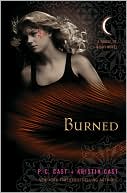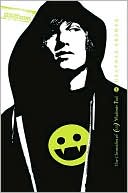Nothing But the Truth (Scholastic Gold)
This Newbery Honor Book by acclaimed author Avi joins the Scholastic Gold line, which features award-winning and beloved novels. Includes exclusive bonus content! In this thought-provoking examination of freedom, patriotism, and respect, ninth grader Philip Malloy is kept from joining the track team by his failing grades in English class. Convinced that the teacher just doesn't like him, Philip concocts a plan to get transferred out of her class. Breaking the school's policy of silence...
Search in google:
In this thought-provoking examination of freedom, patriotism, and respect, ninth-grader, Philip Malloy, is kept from joining the track team by his failing grades in English class. Convinced that the teacher just doesn't like him, Philip concocts a plan to get transferred out of her class. Breaking the school's policy of silence during the national anthem, he hums along, and ends up in a crisis at the center of the nation's attention.Publishers WeeklyStructured as a series of journal entries, memos, letters and dialogues, this highly original novel emerges as a witty satire of high school politics, revealing how truth can easily become distorted. After Philip Malloy, a clownish, rather unmotivated freshman, is punished for causing a disturbance (humming ``The Star Spangled Banner''), facts about the incident become exaggerated until a minor school infraction turns into a national scandal. Philip's parents, several reporters and a neighbor (who happens to be running for the school board) accuse the school of being unpatriotic. Philip gains fame as a martyr for freedom; his homeroom teacher, Miss Narwin, however, faces dismissal from her job. After gleaning the points of view of many characters, readers will side with Miss Narwin and will recognize the hollowness of Philip's eventual victory. It is clear that Avi ( The True Confessions of Charlotte Doyle ) is attuned to the modern high school scene. With frankness and remarkable insight, he conveys the flaws of the system while creating a story that is both entertaining and profound. Ages 11-up. (Oct.)
Chapter One\ \ \ Tuesday, March 13\ \ \ 10:35 P.M.\ \ From the Diary of Philip Malloy\ \ \ Coach Jamison saw me in the hall and said he wanted, to make sure I'm trying out for the track team!!!! Said my middle school gym teacher told him I was really good!!!! Then he said that with me on the Harrison High team we have a real shot at being county champs. Fantastic!!!!!! He wouldn't say that unless he meant it. Have to ask folks about helping me get new shoes. Newspaper route won't do it all. But Dad was so excited when I told him what Coach said that I'm sure he'll help.\ Saw a thing on TV about Olympic committees already organizing all over the country. Olympics. I'm going to be there! County champs. State champs. College champs. Then Olympics! Folks always reminding me about the money they're putting aside for my college, which is the only way to go. That's what did Dad in, dropping out. Too hard to get noticed with just clubs.\ Rainy and cold. I hate this kind of weather. Slows you down. Still ran six miles. I'm getting stronger.\ Oh, yeah.... At lunch Sarah Gloss came up and said she had to speak to me. Said this girl, Allison Doresett, likes me. I had to act cool because I wasn't sure who she was. Then I remembered she's in my English class and is really decent. She must have liked that gag question I asked. The two of us would be front-of-the-line. Bet she heard about my running too. Girls go for guys who win. Ta-da! It's Malloy Magic time!\ Talk about Malloy Magic.... This time for -- dadum! -- Miss Narwin. I mean, what can you do with an English teacher who's so uptight shemust have been put together with super glue. Try to make a joke -- lighten things up a bit -- she goes all flinty-faced. Shift to sweet, she goes sour. I mean, people can't have their, own minds about anything!!! Talk about a free country!!! And the stuff we have to read! Can't believe how stupid and boring Jack London is! I mean, really. The Call of the Wild. Talk about dogs! Ma says she had to read it when she was in school. There has to be better stuff to read for ninth grade somewhere. I thought high school was going to be different.\ Have to figure a way to run past Narwin.\ \ 10:45 P.M.\ From a Letter Written by\ Margaret Narwin\ to Her Sister, Anita Wigham\ \ \ \ \ Yes, Anita, I suppose that after doing anything for twenty-one years a body does get a little tired. And I have been teaching English at Harrison High for just that long. All the same, I remain steadfast in my belief that my life was meant to be the bringing of fine literature to young minds. When the connection is made -- and from time to time it is made -- it's all worth it. Is it wrong to speak of the work as a calling? Well, teaching is almost a religion to me. I will complain from time to time, but -- it is my life. The truth is, I like it.\ But the other truth, Anita, is that students today are not what they used to be. There is no love of literature. Not the way you and I learned it from Mother. Young people don't read at all today- outside of school requirements. They come to literature reluctantly at best, fighting me every inch of the way. It's not as if they aren't bright. They are. And I like them and their capacity for independence. But the other side of that independence is a lack of caring for anything beyond themselves. If they ask me once more "What's this have to do with us?" I think I'll scream. Of course, I don't scream. You have to treat them with care and fairness. Fairness is so important to them.\ For example: these days I'm teaching The Call of the Wild. A student raised his hand to say he didn't understand "who was calling who." Now if I were to laugh or mock, he would be insulted. And I would lose him.\ This boy, Philip Malloy, is new to me. I met his parents at First Night, and they seem like pleasant folks; they come regularly to PTA meetings. They are educated -- she is, anyway. I'm not sure what they do.\ But this Philip -- an only son, by the way, which may be the problem -- is only a middling student, and it's a shame. A nice-looking boy. A boy I like. Intelligent. With real potential. Perhaps that's why he irritates me so -- for he shows no desire to strive, to make sacrifices for the betterment of self, the way we were taught. And, oh, my, Anita, so restless! Worst of all, like so many of them, he exhibits no desire to learn. No ambition at all! But it's not even that I mind so much. No, it's a certain something -- a resistance -- to accepting the idea that literature is important. For him or anyone! But it is. It is! If I could only convince students of that. It's that desire that keeps me going.\ I can hear you saying, "Come on down to Florida, Anita, I don't know if I am ready for that yet.\ Yes, I could take early retirement. Mr. Benison (scence) is doing so. But then, he's older than I. And has a wife who works. The truth is, Anita, I would be lost without my books, my teaching, my students.\ I had a note from Ethel Truebel! Do you rememberher? She used to be in the West Fork Church congregation years ago. It seems ...
\ Publishers Weekly\ - Publisher's Weekly\ Structured as a series of journal entries, memos, letters and dialogues, this highly original novel emerges as a witty satire of high school politics, revealing how truth can easily become distorted. After Philip Malloy, a clownish, rather unmotivated freshman, is punished for causing a disturbance (humming ``The Star Spangled Banner''), facts about the incident become exaggerated until a minor school infraction turns into a national scandal. Philip's parents, several reporters and a neighbor (who happens to be running for the school board) accuse the school of being unpatriotic. Philip gains fame as a martyr for freedom; his homeroom teacher, Miss Narwin, however, faces dismissal from her job. After gleaning the points of view of many characters, readers will side with Miss Narwin and will recognize the hollowness of Philip's eventual victory. It is clear that Avi ( The True Confessions of Charlotte Doyle ) is attuned to the modern high school scene. With frankness and remarkable insight, he conveys the flaws of the system while creating a story that is both entertaining and profound. Ages 11-up. (Oct.)\ \ \ \ \ Children's LiteraturePhillip Malloy is in ninth grade, and he dreams of being a track star. However, there is one thing in his way: Miss Narwin, his English teacher and homeroom teacher. The poor grade he has earned in her English class is keeping him from joining the track team. As a result, Phillip begins to lash out against Miss Narwin by humming The National Anthem during homeroom, and pretty soon, the whole situation spins out of control, as school bureaucracy, parental issues, the media, and teenage angst all enter into the mix. Phillip and Miss Narwin soon find themselves at the center of a much larger controversy of a completely unrelated issue: the right of a student to express patriotism. This award-winning novel by Avi shows how easily a simple act of defiance by a teenager can soon become the center of the political correctness debate waging in the United States. This is an interesting, and yet disturbing, story that captures the unfortunate reality of today's school system and the media frenzy around it. Although written for young readers, it is also a good read for parents and educators. As is typical of Avi, the writing is riveting and revealing. 2004 (orig. 1991), Orchard Classics, Ages 14 up. \ —Sheree Van Vreede\ \ \ Children's Literature\ - Susan Wilde\ Through a series of memos, journal entries, phone conversations and newspaper articles, this book uses documentary techniques to tell the story of ninth-grader Philip Malloy who is suspended from school for humming "The Star Spangled Banner." Irony, parallels, contradictory viewpoints, and character-deepening revelations come in bits and pieces that create an astounding whole. Themes include a father who wants his son to conquer a world he can't, to a boy who cannot grow because he is imprisoned by his spite.\ \ \ \ \ School Library JournalGr 6-9-- Ninth grader Philip Malloy finds himself unable to participate on the track team because of his failing grade in English. Convinced the teacher, Margaret Narwin, dislikes him, he concocts a scheme to get transferred from her homeroom: instead of standing ``at respectful, silent attention'' during the national anthem, Philip hums. Throughout the ensuing disciplinary problems at school, his parents take his side, ignore the fact that he is breaking a school rule, and concentrate on issues of patriotism. The conflict between Philip and his school escalates, and he quickly finds the situation out of his control; local community leaders, as well as the national news media, become involved. At this point, the novel surges forward to a heartbreaking, but totally believable, conclusion. Avi carefully sets forth the events in the story, advancing the plot through conversations between students, Philip's parents, school personnel, and community politicians, while Philip's point of view is revealed through his diary entries, and Margaret Narwin's through letters to her sister. Also enriching the narrative are copies of school memos and newspaper articles, transcripts of speeches delivered, and copies of letters received by both Philip and his teacher; each document provides another perspective on the conflict and illuminates the many themes that beg to be discussed--most notably the irony of lives destroyed because of the misuse of power and the failure of people to communicate. Admirably well crafted and thought provoking. --Ellen Fader, Westport Public Library, CT\ \








